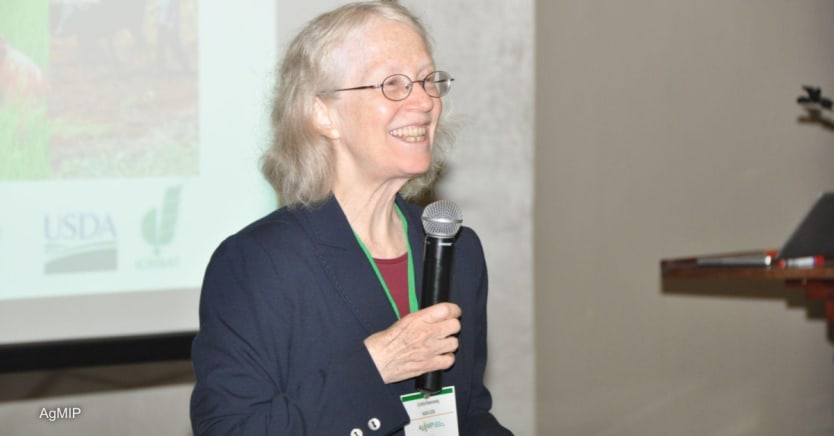
Cynthia Rosenzweig, senior research scientist at the NASA Goddard Institute for Space Studies, has won the 2022 World Food Prize for her work modeling the impact of climate change on global food production.
Rosenzweig is an agronomist and climatologist, and founder of the Agricultural Model Intercomparison and Improvement Project, known as AgMIP. The international project models how agricultural and food systems are affected by climate change, providing vital data necessary for food system transformation.
Get the inside track on how agriculture, nutrition, sustainability, and more are intersecting to remake the global food system in this weekly newsletter.
“In agriculture, for the production side, we have to do field trials and wait for the crops to grow, test different adaptation strategies like planting earlier or putting in efficient irrigation, changing cultivars, changing crops,” Rosenzweig told Devex in an interview.
“It takes a long time to be doing all those field experiments, so by using the models which are growing the crops in the computer, we can test many more interventions more quickly and then move to the trialing in the countries, but in a much more targeted way,” she said.
The World Food Prize, which comes with a $250,000 award, is awarded each year to someone who has dedicated their career to eradicating global hunger through improving the quality, quantity, or availability of food. It is considered the “Nobel Prize” for food and agriculture.
“As we go forward and really bring the food system to bear with climate change, we need to avoid silos between mitigation and adaptation in the food system.”
— Cynthia Rosenzweig, senior research scientist, NASA Goddard Institute for Space StudiesAs a graduate student in the early 1980s, Rosenzweig said her colleagues at the NASA Goddard Institute were just beginning to model the effects of climate change. Given her agronomy background, she was one of few people who could answer the question of how the food system might be impacted.
Rosenzweig, who has farmed in Italy and New York, was one of the first scientists to show that climate change was directly affecting food production. The methodology she used has become fundamental to climate change impact assessments, and she has worked on three Intergovernmental Panel on Climate Change global assessments. Her research has also contributed to the scientific underpinnings of the United Nations Framework Convention on Climate Change.
“For a long time all the studies focused on agricultural production. How would climate change affect farmers’ fields and growing of crops worldwide? But now, in really the last five years or so, the food system approach has really come to the fore,” Rosenzweig said.
“When we think about climate change and food, we have to not just only think about the production side, which is still crucially important … but we have to think of it as a system with the production, the supply chains getting the food out, and of course the consumption side as well,” she said.
The data gathered by AgMIP’s scientists can directly inform policy, Rosenzweig said, and has helped more than 90 countries build resilience to climate change. She calls the project “a giant capacity building exercise,” which also makes projections more rigorous because it brings together multiple models, providing a stronger evidence base than a single model.
Her work has also helped countries develop their National Action Plans and National Determined Contributions as required by the 2015 Paris Agreement.
“In order to make those decisions in their own countries, they need to have evidence of what is actually going on in regard to both what are their emissions of greenhouse gases and also what are the risks to their production system,” Rosenzweig said. “Models are really important for this.”
Models also help ensure NDCs are evidence-based, she said.
The link between food and climate change must be seen going in both directions, Rosenzweig said: how agriculture and food production affects the climate, but also how climate change affects food production and the food system.
“As we go forward and really bring the food system to bear with climate change, we need to avoid silos between mitigation and adaptation in the food system. This is something AgMIP is working on,” Rosenzweig said.
“I am encouraged by … this great impetus to bring food to the climate change table, and it really is happening now.”









